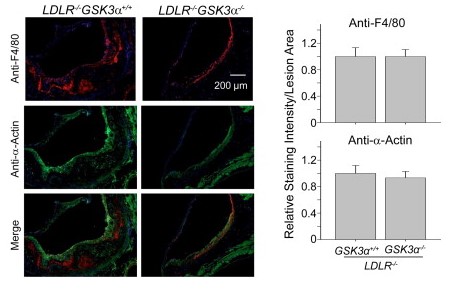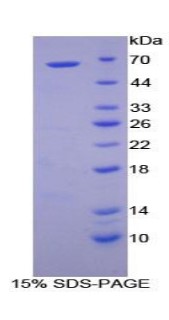GSK3A
-
Official Full Name
glycogen synthase kinase 3 alpha -
Overview
This gene encodes a multifunctional Ser/Thr protein kinase that is implicated in the control of several regulatory proteins including glycogen synthase, and transcription factors, such as JUN. It also plays a role in the WNT and PI3K signaling pathways, as well as regulates the production of beta-amyloid peptides associated with Alzheimers disease. [provided by RefSeq, Oct 2011] -
Synonyms
GSK3A;glycogen synthase kinase 3 alpha;glycogen synthase kinase-3 alpha;GSK-3 alpha;serine/threonine-protein kinase GSK3A
Recombinant Proteins
- Human
- Rhesus macaque
- Rat
- Mouse
- E.coli
- Sf9 Cells
- Insect Cells
- Mammalian Cells
- S.frugiperda
- Wheat Germ
- HEK293
- HeLa
- In Vitro Cell Free System
- Sf21 Cells
- GST
- Non
- His
- T7
- DDK
- Myc
- Avi
- Fc
- Flag
Background
What is GSK3A protein?
The GSK3A protein, also known as Glycogen synthase kinase-3 alpha, is one of the key proteins in the human body. Discovered in the late 1980s, its initial purpose was linked with the regulation of glycogen synthesis in response to insulin. The protein saved it from obscurity and brought it into the field of widespread biological research.
GSK3A falls within the broader family of glycogen synthase kinases, which are serine/threonine kinases. The gene coding for the GSK3A protein is located on the chromosome 19q13.2 in humans. These genes were believed to only be responsible for regulating glycogen synthesis until researchers discovered that they are vital for cellular processes such as neurodevelopment, apoptosis, metabolism, and cellular differentiation.
Elaborating on the GSK3A protein structure, it is characteristically consisting of a typical protein kinase core, along with a set of extended protein chains. The N-terminal end of the protein is made up of an ATP-binding domain, comprising 12 subdomains. These unique characteristics of the GSK3a protein contribute to its critical functioning in various signal transduction pathways.
What are the functions of GSK3A protein?
The primary functions of the GSK3A protein are extensive and encompass various aspects of cellular activity. They include regulating the response to growth factors, differentiating cells, and helping tissue and embryonic development. This protein also plays a vital role in maintaining the homeostasis of the body by regulating insulin, which impacts glucose metabolism. Furthermore, GSK3A is heavily involved in the Phosphatidylinositol-3-kinase (PI3K)/Akt signaling pathway, which plays crucial roles in cell survival and growth.
GSK3A protein related signal pathway
The GSK3A protein related signal pathway is complex and multifunctional. Primarily, it acts as an inhibitor in the Wnt signaling pathway, thus controlling embryonic development. When this inhibition is removed, the Wnt pathway gets activated, leading to a series of events that facilitate cell growth and differentiation. Furthermore, it also contributes to the PI3K/Akt pathway, which is critically essential for cell survival and proliferation.
GSK3A protein related diseases
The disruption in the GSK3A protein's function has been associated with various diseases. The protein's overexpression or loss of function mutations are contributing factors to several medical conditions. Studies have found a strong association between GSK3A and neurodegenerative diseases like Alzheimer's. Biopsied brain tissue of Alzheimer's patients showed higher than average levels of GSK3A, indicating that the protein may play a role in the disease's progression. Moreover, researchers have also found that abnormal levels of GSK3A protein could lead to bipolar disorder and schizophrenia. It's also linked with various types of cancers like pancreatic cancer, colon cancer, and leukemia, with studies suggesting that the protein could be a potential oncogene.
- Cancers: Aberrant Wnt/β-catenin and PI3K/Akt signaling via GSK3A implicated in several cancers.
- Alzheimer's disease: Hyperphosphorylation of tau protein by GSK3A contributes to neurofibrillary tangles formation.
- Bipolar disorder: Increased GSK3A activity associated with mood dysregulation in bipolar patients.
- Diabetes: Reduced insulin inhibition of GSK3A leads to impaired glycogen synthesis and glucose uptake.
- Neuroprotection: GSK3A inhibitors may help protect neurons from apoptosis induced by various stressors like amyloid-β, oxidative stress etc. This could aid conditions like Alzheimer's, Parkinson's, stroke etc.
- Angiogenesis modulation: Precisely regulating GSK3A activity may promote revascularization for cardiac ischemia, wound healing by modulating VEGF/Notch pathways.
- Bone regeneration: GSK3A plays roles in bone homeostasis. Precise modulation could enhance osteoblast differentiation for treating fractures or osteoporosis.
The ample association of GSK3A with numerous conditions has made the protein an appealing target for pharmaceutical development. The protein's integral role in several signaling pathways sets the stage for the development of inhibitors targeting the GSK3A protein, with the intention of either replacing or augmenting existing therapies. In neurodegeneration, for instance, cognitive decline could be slowed down using such inhibitors. On the other hand, the unique niche that GSK3A occupies in the development and growth functions keeps it an active area of interest.
- Neuroprotection: GSK3A inhibitors may help protect neurons from apoptosis induced by various stressors like amyloid-β, oxidative stress etc. This could aid conditions like Alzheimer's, Parkinson's, stroke etc.
- Angiogenesis modulation: Precisely regulating GSK3A activity may promote revascularization for cardiac ischemia, wound healing by modulating VEGF/Notch pathways.
- Bone regeneration: GSK3A plays roles in bone homeostasis. Precise modulation could enhance osteoblast differentiation for treating fractures or osteoporosis.
Case Study

(Nicole S. Banko, 2014)
Fig2. Representative images of cross sections of the aortic sinus from Ldlr−/−;Gsk3a+/+ and Ldlr−/−;Gsk3a−/− mice analyzed by immunofluorescence microscopy. Sections were stained with antibodies specific for macrophages/foam cells (anti-F4/80; red) or vascular smooth muscle cells (anti–α-actin; green). Immunostained areas were quantified and normalized to total lesion area. n = 8 to 9 per group (B and C); n = 4 per group (D). †P < 0.05 relative to Gsk3a+/+ mice.
Case 2: Freitas MJ, et al. Isoform-specific GSK3A activity is negatively correlated with human sperm motility. Mol Hum Reprod. 2019 Apr 1;25(4):171-183. doi: 10.1093/molehr/gaz009. PMID: 30824926; PMCID: PMC6440577.
In mouse and bovine sperm, GSK3 activity is inversely proportional to motility.Yet in human sperm, an isoform-specific correlation between GSK3A and sperm motility was never established. In order to analyze GSK3 function in human sperm motility, normospermic and asthenozoospermic samples from adult males were used to correlate GSK3 expression and activity levels with human sperm motility profiles.

Fig3. GSK3 in human testis and spermatozoa and correlation with sperm motility. (A) Western blot analysis of total GSK3 and serine phosphorylated GSK3 isoforms in human testis and spermatozoa, mouse testis and HeLa cells; 30 μg of protein obtained in RIPA1x were loaded per sample. From top to bottom, GSK3 was immunodetected with the following antibodies: anti-GSK3A/B antibody, anti-GSK3A antibody and anti-GSK3B antibody, anti-GSK3A pS21 and anti-GSK3B pS9. (B) Immunoblot of total and serine phosphorylated GSK3 isoforms in human normospermic (n = 3) and asthenozoospermic (n = 4) ejaculated spermatozoa.
Quality Guarantee
High Purity

Fig1. SDS-PAGE (Cat. No.: GSK3A-634H)
Involved Pathway
GSK3A involved in several pathways and played different roles in them. We selected most pathways GSK3A participated on our site, such as Chemokine signaling pathway,Dopaminergic synapse,Non-alcoholic fatty liver disease (NAFLD), which may be useful for your reference. Also, other proteins which involved in the same pathway with GSK3A were listed below. Creative BioMart supplied nearly all the proteins listed, you can search them on our site.
| Pathway Name | Pathway Related Protein |
|---|---|
| Chemokine signaling pathway | PLCB2,GNG10,CXCR5,CCL24,CCR5,CCL3L1,CCL21B,CX3CL1,CXCL6,GM13304 |
| Dopaminergic synapse | PPP2R3C,PPP1CC,CREB3,PPP3CA,PPP2R5C,GNB3,PRKCG,PRKACB,CALM3,ARNTL |
| Non-alcoholic fatty liver disease (NAFLD) | IRS1,BAX,MLXIPL,FASLG,NDUFA4L2,PIK3CB,COX8C,IRS2,ADIPOR1,INS |
Protein Function
GSK3A has several biochemical functions, for example, ATP binding,protein binding,protein kinase A catalytic subunit binding. Some of the functions are cooperated with other proteins, some of the functions could acted by GSK3A itself. We selected most functions GSK3A had, and list some proteins which have the same functions with GSK3A. You can find most of the proteins on our site.
| Function | Related Protein |
|---|---|
| tau-protein kinase activity | CDK5,PHKG1,MARK4,MARK1,MARK2,CSNK1D,PRKAA1,PHKG2,GSK3B |
| protein serine/threonine kinase activity | ACVR1BA,CSNK1G2B,MAP4K2,RPS6KB2,AKT2,Aatk,PBK,KSR2,CSNK1G2,CDK15 |
| protein binding | NDOR1,FRG1,RNASE1,SERPINB5,PRDX6,ARF4,RPS19BP1,C9orf142,TECR,CDK5 |
| ATP binding | MAP4K2,ABCG2A,ALDH18A1,MAP2K6,ABCG1,PTK7,ACTR2A,AK7,ATP7A,ABCB6A |
| protein kinase A catalytic subunit binding | PRKAR2B,PKIA,KCNQ1,PRKAR2A,SOX9,CSK,EZR,GSK3B,PRKAR1A,PJA2 |
Interacting Protein
GSK3A has direct interactions with proteins and molecules. Those interactions were detected by several methods such as yeast two hybrid, co-IP, pull-down and so on. We selected proteins and molecules interacted with GSK3A here. Most of them are supplied by our site. Hope this information will be useful for your research of GSK3A.
YWHAG;AXIN1;GSKIP;FRAT1;DEAF1;LRP6;HSP90AB1;ZDHHC17;saicar;APP
Resources
Related Services
Related Products
References



